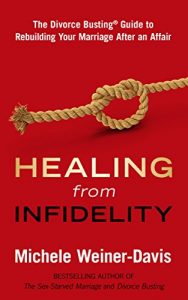Healing from Infidelity: Why Some Couples Stay Together

Day 1 of Evolution of Psychotherapy Conference, Anaheim
The highlight of the day for me was the talk by Michelle Weiner Davis (author of "The Sex Starved Marriage", "Divorce Busting", and "Healing from Infidelity") and her step-by-step treatment approach to dealing with infidelity in a relationship. Like myself, she argues that no two couples, and no two affairs, are alike. It is so important that in therapy each treatment plan is customized to the couple but also offers structure and direction so each partner has a sense of control and predictability during one of the most difficult and unpredictable times of their life.
Here are some notes from her talk about couples healing from infidelity:
- 41% of all marriages in the United States end in divorce but only a small percentage of these divorcing couples report infidelity as the reason their relationship failed. Thus, many couples do stay together after a partner cheats, although struggle to know how to handle the difficult emotions they will experience along the way.
- When in crisis, emotional control, empathy and healthy coping skills go "offline." It is almost physiologically impossible to think rationally when you are experiencing high emotional arousal (i.e. learning the news or details of a betrayal by your partner). Thus, is important to reduce your stress as much as possible to get back to a place of functioning and resolve the crisis stage aka “step one” of the affair recovery model. Taking time off work, avoiding conversations with family or children right away, and arranging opportunities for time with your partner (both talking and not talking about what happened) can be helpful as well as scheduling individual self-care and leisure activities during the first few weeks or months post-affair.
- A perceived rejection by the betrayed partner is experienced as a physical pain just like an ulcer or migraine headache… some betrayed partners even report feeling temporarily better after taking two aspirin. FMRI research supports that the brain is activated upon discovery of an affair, as if in physical pain.
To repair from an affair, couples typically experience three stages:
- Crisis stage – for the betrayed partner this includes PTSD-like symptoms, anger, devastation, obsession, inability to concentrate or communicate effectively; for the partner who strayed it may include feelings of guilt, confusion, loss and/or relief
- Rebuilding stage – duration of this stage varies depending on the involvement and commitment of each partner, coping and interventions utilized to repair (or not repair) the relationship post-affair
- Maintenance stage – after rebuilding, the focus is on recovery and relationship maintenance for the future of the couple
For couples who chose to stay together, it is crucial that they work through stage 1 with therapeutic direction for their relationship and appropriate coping skills so they can start doing the repair work and start feeling better faster.
For couples who chose not to stay together their decision is typically influenced by:
- Shame and the negative opinions of cheating from friends/family/media encouraging the partner to "leave him/her" or "not put up with that"
- Feared hopelessness that they will never be able to forget or forgive their partner
- Unwillingness of one partner to participate in the recovery process.
Successful recovery from an affair involves the process of addressing what happened in the relationship as well as what happened (and is happening presently) for each partner. This is a separate journey for the betrayed partner and the unfaithful partner.
Although working through betrayal can and does yield positive transformations, affairs are destructive for relationships. The pain can be overwhelming at times and the road can be long and difficult for a couple in crisis. The healing process is lengthy, demanding, involves triggers and unpredictable emotion. You might ask yourself “Is it worth it?” A second question you might consider is the alternative—separating, withdrawal, or continued infidelity—and how that would make you feel. Whatever your decision, it is important to acknowledge you are not alone. With support and understanding, there is hope for a relationship after infidelity.
Meeting Michele:



Helpful Resources:
Filed Under: Couples/Marriage, Evolution of Psychotherapy Conference, Infidelity


